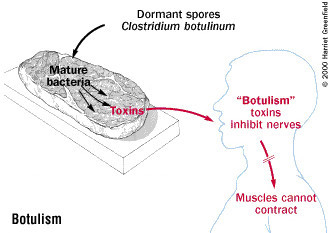Botulism
- Reviewed by Howard E. LeWine, MD, Chief Medical Editor, Harvard Health Publishing; Editorial Advisory Board Member, Harvard Health Publishing
What is botulism?
Botulism is a form of poisoning caused by exposure to Clostridium botulinum bacteria. These bacteria manufacture a chemical poison known as botulinum toxin that interferes with muscle function in many areas of the body, causing paralysis of individual muscles or groups of muscles. Exposure to this toxin is life-threatening, since one of the muscles it can paralyze is the diaphragm, the muscle that controls breathing.

You can be exposed to the bacteria causing botulism in several ways, the most familiar being by eating contaminated food. In most food-borne cases of botulism in adults, home-canned foods are responsible. The bacteria that cause botulism exist in dirt and dust as a spore, but this form is inactive and does not produce toxin. However, when a spore is moved into a low-oxygen environment such as an enclosed jar or can, it can reproduce and make its dangerous toxin.
Home-canned vegetables that are not highly acidic (asparagus, green beans, peppers, beets, and corn) are good incubators for botulism bacteria, unless they are heat-treated appropriately to kill the spores during the canning process and eaten quickly after opening. The bacteria can release large quantities of toxin into the canned food jar, causing botulism symptoms in people who sample the produce. Home-canned, smoked, or fermented fish is also a risk.
Recent outbreaks have been reported from commercial carrot juice and home-canned bamboo shoots. In the United States, roughly 100 people become ill with botulism each year. About a quarter are due to consumption of contaminated food. Most cases today (about 70%) occur in infants. Babies less than 1 year old, especially those that are breastfeeding, have a different intestinal system than adults. Spores swallowed by an adult with a mature digestive tract usually will remain in their hibernating, inactive state. But spores ingested by a young infant can reproduce and can form toxin that is absorbed into the bloodstream, causing botulism.
In one out of five cases of botulism in infants, the infant has eaten raw honey. More rarely, botulism spores are found in corn syrup. Since the majority of cases of infant botulism can't be traced to a food source, experts suspect that babies are exposed simply by swallowing small amounts of dust or dirt.
Rarely, botulism is the result of a contaminated wound. Most wound botulism today occurs in people who inject or snort recreational drugs.
Symptoms of botulism
All of the symptoms of botulism are the result of nerve paralysis during exposure to the toxin. Symptoms usually begin within one to two days after eating contaminated food. Symptoms of infant botulism and wound botulism also appear suddenly.
The earliest symptoms involve the eyes and face, because nerves controlling their function are affected most quickly by the botulism toxin. Early or mild symptoms, which may go away on their own, include:
- abdominal pain, nausea, vomiting, or diarrhea (not usually present in wound botulism)
- double vision, blurred vision (especially when viewing close objects), or drooping eyelids
- dryness of the mouth.
More severe cases can cause these additional symptoms:
- slurred or garbled speech
- difficulty swallowing
- muscle weakness in arms or legs; general fatigue
- difficulty breathing, sometimes severe
- in infants, usually constipation at first; also lethargy and a "floppy" neck, arms, and legs, demonstrating weak muscles; difficulty feeding; failure to cry well.
Diagnosing botulism
If your doctor suspects botulism after asking you about your medical history and examining you, both blood and stool samples may be tested to check for the presence of botulinum toxin. Generally these tests are done in a government laboratory that specializes in detecting botulism. Sometimes botulism bacteria can be grown from a stool sample.
Botulism is uncommon enough that your doctor will consider other explanations for your symptoms. In most cases, several other tests will be ordered:
- a brain scan, such as a magnetic resonance imaging (MRI) scan, to check for other diagnoses such as stroke
- blood tests to check for Lyme disease
- a lumbar puncture to help to distinguish botulism from a similar illness called Guillain-Barre syndrome
- an electromyogram, a test of nerve and muscle function, to determine if the problem might be another muscle-weakening disease such as polymyositis or myasthenia gravis.
Once definite evidence of botulism is found with laboratory tests, usually no additional testing is needed.
Expected duration of botulism
Most paralysis symptoms of botulism last for several weeks and then slowly go away in the following months. Sometimes fatigue and shortness of breath can last for years.
Preventing botulism
You can prevent food-borne botulism with careful food-handling techniques:
- When home canning, use a pressure cooker that can reach temperatures adequate to kill botulism spores. Preserved food should be heated above 248º F (120º C) for at least five minutes during the canning process. Some foods, such as jams and jellies, do not require a pressure cooker because their high sugar level makes it difficult for Clostridium botulinum bacteria to grow.
- Do not eat or store cooked foods that have stayed at room temperature for more than four hours.
- Do not eat or even taste canned goods from a jar that has a bulging lid or a bad odor.
- Do not leave foil-wrapped baked potatoes at room temperature. They should be served hot or refrigerated.
- Do not store chopped garlic or onions in oil at room temperature.
- If you are eating home-canned fish or vegetables, first boil the food for 10 minutes with frequent stirring. This will destroy any botulinum toxin that has been produced in storage.
- Do not feed honey or corn syrup to infants less than 1 year old.
To prevent wound botulism, do not use recreational injected drugs. Report deep wounds promptly to a physician.
Treating botulism
Botulism usually requires hospitalization, sometimes for a prolonged time. The main treatment for botulism is administration of an antitoxin (a chemical antidote to the toxin), and good nursing support and physician care, sometimes in an intensive care unit, with machine support by a ventilator as needed to assist breathing. If antitoxin is given early in the course of the disease, it will prevent further paralysis from the toxin, but it does not affect symptoms that are already present. Physical therapy can be helpful in aiding recovery of muscle strength.
Infants with botulism present a special challenge: They are treated with antitoxin but are not given antibiotics because killing the botulism bacteria in their gut can cause a sudden release of more antitoxin. Instead, medicines that cause vomiting or treatments such as enemas are used to remove undigested food from the gut.
Wounds that are a source of botulism must be treated with surgery to remove contaminated tissue.
When to call a professional
Botulism can worsen rapidly and is a life-threatening emergency. If you or your infant has symptoms of botulism and these symptoms do not have a known explanation, you should contact a physician immediately.
Prognosis
Although botulism can cause severe and prolonged symptoms, most people recover completely from the illness. Early treatment reduces the risk of permanent disability and death.
Additional info
Food Safety and Inspection Service
https://www.fsis.usda.gov/food-safety-education
Centers for Disease Control and Prevention (CDC)
https://www.cdc.gov/
About the Reviewer

Howard E. LeWine, MD, Chief Medical Editor, Harvard Health Publishing; Editorial Advisory Board Member, Harvard Health Publishing
Disclaimer:
As a service to our readers, Harvard Health Publishing provides access to our library of archived content. Please note the date of last review or update on all articles.
No content on this site, regardless of date, should ever be used as a substitute for direct medical advice from your doctor or other qualified clinician.















